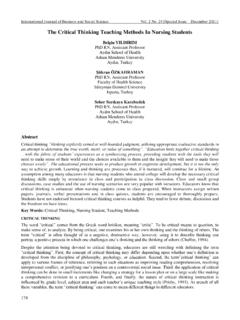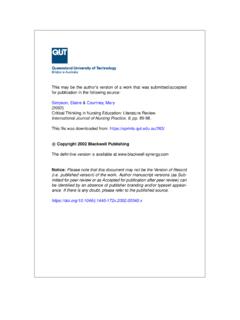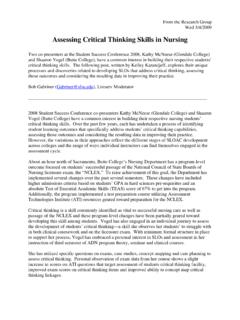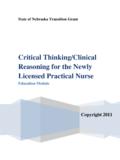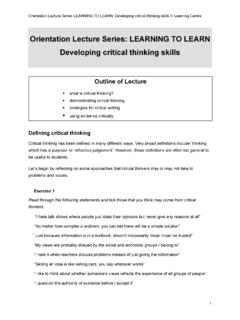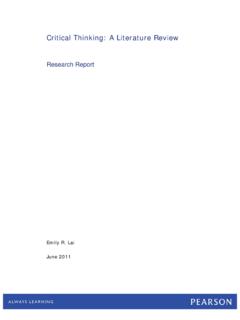Transcription of Critical Thinking: Intuitive, Logical or Both?
1 Adapted from: 2003 nursing Spectrum Nurse Wire ( ). All rights reserved. Used with permission. 1 Critical thinking : Intuitive, Logical or Both? By Rosalinda Alfaro-LeFevre, RN, MSN, ANEF In the literature and at conferences, nurses are increasingly asking the question, What roles do intuition and logic play in Critical thinking , clinical decision making, and clinical judgment? Somehow, it seems that we have two camps --- one that stresses that nursing should be creative and intuitive, and the other that insists that nursing should be Logical , scientific, and evidenced-based. The following, from a recent article in the Journal of nursing Scholarship shows some of the issues and contradictions out there: Health professionals throughout the world place more emphasis on the utilization of research findings for evidence-based health care decisions.
2 However, considerable evidence indicates that much professional decision making is not based on the "best evidence" but instead on an individual's subjective intuitive judgments concerning the appropriate actions to take for a given clinical challenge. This intuitive approach has resulted in huge variations in clinical practice and the outcomes associated with it. Indeed, nursing has positively embraced this stance and has used intuition as the mark of an expert in the As someone who writes and consults on improving thinking , I feel compelled to clear up this muddy point: Is Critical thinking in-tuitive or Logical ? Intuition and Decision Making In these days of increased accountability, policy makers, health care professionals, and health care consumers want to know the reasoning behind important decisions.
3 Most agree that intuition, an important part of thinking , is the result of years of experience and in depth knowledge of patients and circumstances. Yet, there s confusion about what intuitive thinking en-tails. Some believe that the rapid thinking that goes on inside experts heads is intuitive, rather than Logical . Others believe that if individuals can t explain their thinking , then this must also intuition. But, consider the following points. To the outsider, experts actions may seem to be based on intuition alone. But, experts rapid thinking is usually the result of using intuition and logic together. Many nurses make leaps in thinking with intuitive hunches, then almost at the same time draw on logic and evidence to make well-reasoned judgments. Think about this example: An ICU nurse walks into a room, takes one look at the patient, and with expert, all-seeing eyes, decides, some-thing s wrong here.
4 Most likely, her eyes will flash to the cardiac monitor---looking for cardiac problems---as she talks with the patient and grabs a blood pressure cuff to check the blood pressure. Here s how my mother, who nursed during World War II, describes the above thinking : When you do a job for years, you learn what to look for and what to do. In almost a split second, you evaluate what you see, correlate it with what you ve learned, and take appropriate action. It s more than just intuition---it s Logical as well. The mark of experts is not whether they re intuitive or Logical , but whether they re aware of their innate tendencies and whether they know strategies that promote both intuitive and Logical abilities. Another mark of experts is that they know that Critical thinking is contextual---it changes, depending on cir-cumstances.
5 Sometimes intuitive thinking is more appropriate than Logical thinking , and vice versa. For example, brain storming sessions are a great time to nurture intuition, because Logical thinking may constrain and block ideas. On the other hand, developing policies, procedures, and plans of care requires more Logical , evidenced-based thought. Experts who juggle several priorities at once often have trouble explaining their thinking at the very moment it s happening. For this reason, some nurses have con-cluded that this is intuitive thinking . I ques-tion this conclusion. Experts may not be able to explain their thinking at the time, but if it s really important---for example, if these same Adapted from: 2003 nursing Spectrum Nurse Wire ( ). All rights reserved. Used with permission.
6 2 experts are challenged in court to explain the actions they took and the reasons behind them---they can readily reconstruct the logic of their thinking (and if they can t, they re in trouble). What s more likely to be happening when experts can t explain their thinking is that they re either suddenly blocked by the questions they re asked, or that they aren t used to talking about their thinking . They can think for themselves, but they haven t gained the important skill of making their thinking explicit to others. As you can see from the above, Critical thinking is dynamic, requiring interplay of intuitive and Logical thought. Grounded in knowledge and experience, it requires being aware of how you think, being able to explain it to others, and knowing specific strategies to generate and analyze data and ideas (both in yourself and others who have different thinking styles than you do).
7 Boosting Performance To boost performance, we must re-member that Critical thinking isn t like a T-shirt (one sized doesn t fit all). Some people depend on their intuition more than others. Highly intuitive people should be encour-aged to express their intuitive thoughts as much as possible, labeling them as such ( My gut tells me ). When the risks are high, people who rely heavily on intuition should know to check themselves by use Logical evidence-based thinking early in the process. It s important for us all to reflect on our styles and decide whether we prefer step-by-step, precise approaches (indicating that we re likely to be Logical , left-brain dominant thinkers), or whether we like free-form, unconstrained approaches (indicating that we re likely to be creative, intuitive, right-brain dominant thinkers).
8 By recognizing innate tendencies, you can identify stra-tegies that make the most of your talents. You can also push yourself to use and de-velop the less dominant side of your brain. Final Answer Hopefully, I ve made a case for showing that Critical thinking is both intuitive and Logical . When intuition is used alone, there are increased risks and fewer benefits. Intuition often moves problem solving forward quickly, but may result in a lot of trial and error approaches. Logic is the safest approach, but it doesn t foster out of the box ideas and may inhibit right-brain thinkers from getting started . Pairing intuitive and Logical thinkers who have learned specific strategies to promote reasoning (for example, mind-mapping), can bring great Whether using intuition or logic, keep in mind the powerful influence of emotions.
9 Emotion-driven thinking is often off the mark because emotions have incredible power over how you see the situation at hand. If you re feeling optimistic, confident, and happy, ideas and solutions flow freely. If you re pessimistic, angry, afraid or depressed, the opposite is true. To improve thinking , examine what emotions, intuition, evidence, and logic bring to the picture. Keep in mind that Logical , evidence-based thinking is desirable in any situation where the risks are high and the outcomes important. Logical thinking doesn t preclude use of intuition. It simply pushes you to look for evidence to support your intuition, identify the risks, and find ways to get the results you need. NOTE: To download the 2009 Evidenced Based Critical thinking Indicator, sgo to , then click on Publications.
10 References 1 Lamond, D. and Thompson, C. (2000). Intuition and analysis in decision making and choice. Journal of nursing Schlarship, 32(3), p. 411. 2 Alfaro-LeFevre, (2009). Critical thinking and Clinical Judgment: A Practical Approach to Ourcome-focused thinking , 4th Ed. Philadelphia: Elsevier Saunders.. For more on this book click here.

